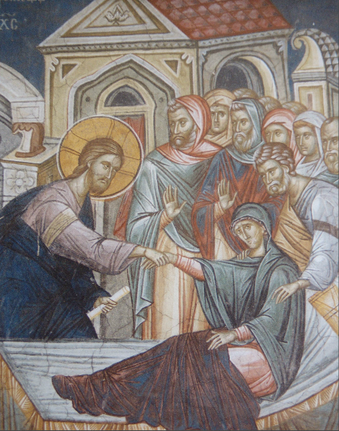 Mark 1:29-39 ‘The whole town came crowding round the door, and he cured many who were suffering’ (Mark 1:33-34a) Not many months ago news of proposed changes in the NHS Devon trust sparked a debate across the Country; should the NHS offer routine surgery to morbidly obese people and to smokers only when these have either shed a few pounds or quit smoking? Or should the system be left as it is, offering appropriate care for all? According to officials, the proposed changes were driven by an attempt to save public funds and to focus the attention of healthcare professionals on those patients with better chances to make a full recovery, without “wasting” – for want of better words – resources on those who were considered more prone to illness because of the their lifestyle. However, this debate quickly revealed a broader ethical dilemma at the root of our society, about whether or not to deny treatment to those who have brought illness upon themselves through bad habits. That is to say, “Who is worthy of care?” and “On whom should we invest our limited resources?” “Who is worthy?” This was (and still very much is) the underlying and divisive question which transcends NHS care to encompass every aspect of our lives. “Why should we show compassion to those whose conditions ae ultimately self-inflicted?” “What charity is more deserving of our money?” “Why should I worry about people outside my family or circle of friends?” To all these questions, and more, a growing number of people might respond that we should not pay for those who have been the cause of their own downfall; that “charity begins at home”; and that limited resources should be invested on those who promise better returns. “Who is worthy of care?” In our first reading Job, a just man whose life has been turned upside-down by circumstances beyond his control, speaks about his dreadful condition. He is very ill, all the members of his family have died, and his great fortune is lost. As things stand, nothing is can bring joy or hope to Job, and in the lowest pits of depression he feels completely abandoned by his friends and by God. Those around him reproach him saying that if he is so stricken down it must be because has sinned; he must have brought illness and misfortune upon himself; what he is experiencing just retribution for his behaviour; and it would be of no use to help or comfort him until he has changed his life and abandoned his bad habits. The people who professed to be Job’s friends are indeed the first to shut their ears and hearts to his plea because, as they see it, he himself it the cause of his own tragic condition, and therefore he is not worthy of care. However, as we turn to the pages of the gospel Jesus teaches us a different way. Here we see the Lord curing those who came or where brought to him without assessing their worthiness, asking them about their faith, or enquiring about the cause of their conditions. But, what we might find even more interesting is that Jesus does not turn away, or judge, or scold anyone, even those who may have brought about their own illnesses. As Jesus meets people in difficulties, people who may well have been in the depths of despair like Job; he just cares for them and cures them. In fact, this scene has two beautiful features; silence and night. Mark tells us that the sick started arriving after sunset, when they could leave their homes or hiding places without fear of being judged or driven away in cold light of day. Then Mark does not report any words said by Jesus – a silence only occasionally interrupted by commands to the demons to shut up. There, in the dead of night, in the silence of prayer, the Lord administers healing beyond comparison and demonstrates that love and care is available to everyone who approaches him. “Who is worthy of care?” We may not have the gifts of healing Jesus demonstrated; yet Jesus gives us a pattern of life for us to imitate, so that we may strive to bring relief to others like the Lord did in the gospel. Our resources, both as a society and as individuals are always limited, yet, the moment we start to question whether a person is worthy of our care, that is the moment we depart from the path Jesus traces for us.
0 Comments
Your comment will be posted after it is approved.
Leave a Reply. |
Archives
June 2020
Categories
All
|
 RSS Feed
RSS Feed


